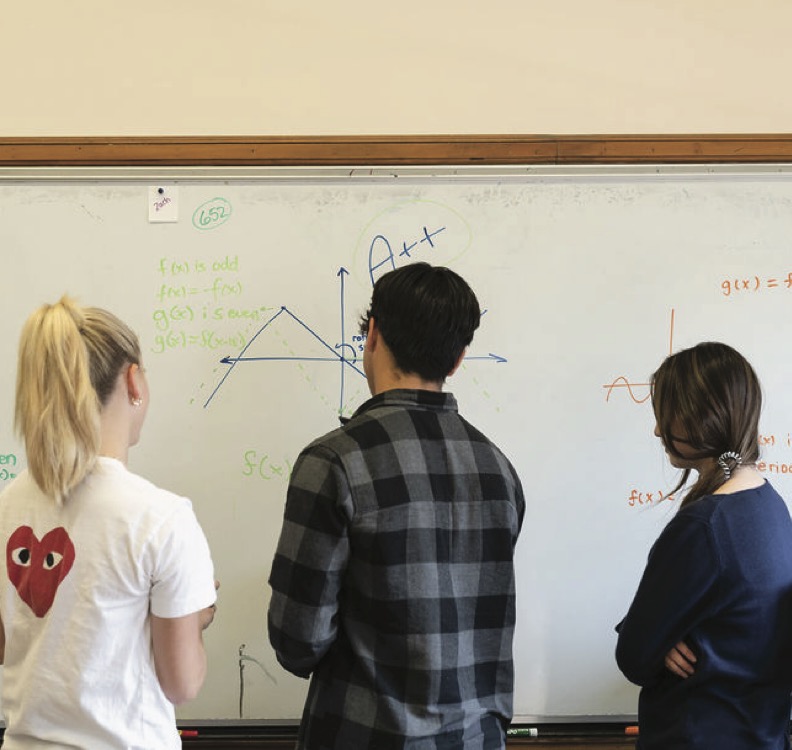Math at work, the Harkness way

Math instructor and Exeter Mathematics Institute Director Laura Marshall decodes our distinctive math program.
When my son was home from college recently, he mentioned the huge amount of information he is told on a daily basis. The learning feels different from his Exeter experience, he observed. He quickly realized that the greatest gift he received from Exeter was that Exeter taught him how to think.
It is an interesting point: Exeter’s math program focuses on creating problem solvers and deep thinkers. In traditional math classes, students are given problems in textbooks and told which methods they should employ to solve them. Exeter’s math students discover ideas on their own by working with one another through unique, interweaving problem sets.
Exeter math is taught, like the rest of our curriculum, in the Harkness tradition. Classes are student-centered. Teachers don’t lecture, we don’t feed students information. I view part of my role as a teacher as being responsible for creating a supportive classroom atmosphere where students are comfortable working with one another and they are unafraid to ask questions. We celebrate mistakes because mistakes create opportunities for learning and for increased collaboration. Growth and mastery emerge through students working together, actively exploring, discussing and explaining ideas to one another. We recently invited a film crew into my classroom to show how math at Exeter works. (You can watch the video of this class at Exeter’s YouTube channel.)
Our math problem sets are different too. Exeter’s dynamic, relevant problem sets (3,700 problems at last count!) keep mathematics interesting and realistic. The open-ended problems are scaffolded in a manner that enables students to work from specific examples to generalizations. Students develop concepts incrementally as they work through the theme-based recurring sequences of problems within our math sets. They dig into problems by searching for patterns, using technology, drawing diagrams, or whatever method seems appropriate to them.
Exeter math faculty began developing our problem sets in the 1990s. They are updated every June when current instructors review and revise the problems based on our own experience and with feedback from our students. The problems remain current and relevant. We are often asked why Exeter’s Math Department doesn’t publish our math problem sets as a book. The answer is easy: they are never finished.
Exeter math works. The way we introduce and scaffold our unique curriculum creates a gateway for developing fundamental problem-solving skills. Our technique moves students toward deeper thinking and stronger understanding that can lead to lifelong enjoyment of mathematical challenges.
Students don’t have to attend Exeter to benefit from our math program. We routinely partner with public, private and parochial school math teachers interested in thinking differently about math instruction. Our customizable Exeter Mathematics Institute fulfills an institutional priority to share the Harkness pedagogy with other educators while providing them with tools they can directly apply to their own curriculum. The end result, we hope, is inspired teachers who are committed to teaching students to gain independence in the learning process in order to become problem solvers. And ultimately, to provide the classroom environment that gives students, like my son, the space and confidence to be independent thinkers.